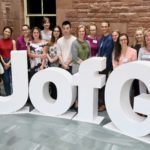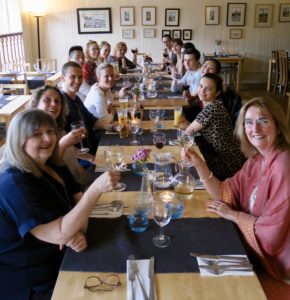
One of Dame Cicely Saunders’ most enduring legacies is the importance of being present, of witnessing, at the end of life. Academic witnessing at the margins of life and death can require balancing an intense intimacy with simultaneously gaining enough distance to ‘see’ significant or representative broader concepts. What does this mean for us as developing researchers in this domain?
We had the pleasure of hosting a wonderful group of grounded and engaged PhD researchers for our multidisciplinary workshop on ‘witnessing at the end of life’ this June (coinciding with the centenary of Dame Cicelys’s birth). Attendees came from Universities around the UK, as well as the Netherlands and even Canada.
Individual paper discussions were framed by two talks given by Dr. Marian Krawczyk and Dr. Naomi Richards on conceptual approaches to witnessing. They highlighted the importance of both abstract and concrete scenarios ranging from witnessing as a researcher with affect, to the history of manipulating public witnessing through legal cases and the news.
“I found the presentations by Marian and Naomi very interesting … [it] got me thinking about how we writers manipulate facts for our own ends”
Following these presentations each of the 16 workshop participants, including students from literature, sociology, anthropology, and psychology, presented their paper to the group for discussion. The format allowed everyone to present their in-progress research and to discuss how it relates to witnessing.
We started with Joe Wood highlighting the parallels between Dame Cicely Saunders and the historical context in which many grappled with ‘witnessing the trauma of a generation’ post WWII. We then ventured into creative non-fiction. The two days involved in-depth discussions ranging from personal narrative accounts of death and dying, through ethical considerations of observing as researchers, to controlled experiments.
Having a mix of similar and different discipline pairings worked well and brought new perspectives, leading everyone to reflect on their work through an enriched lens.
“I was impressed by the quality and depth of all the presentations and discussions were thought-provoking”
“I loved the integration of all the disciplines…It helped me think about how to write differently, and to try and integrate different ways of thinking”.
The main themes that evolved across the two days reflected elements that are crucial to any research considering studying the end of life.
We need to pay attention to the power dynamics of witnessing in end of life research. Whose decision is it to engage in this witnessing? What is happening that is not spoken about?
Highlighting relationships of power led us on to the ethics of witnessing. Can we really be neutral observers, always removed with objectivity? And how does the language we use to describe our research influence the answers we get?
Witnessing requires a lot of emotional labour and several discussions focused on how this is often not spoken about, invisible. There is a need to make our emotional engagement more visible in research, both to help other researchers as well as highlighting how it shapes our findings.
This included thinking of the relational spaces we occupy at the end of life as ‘unfamiliar’. Relating to other people, new routines, and even our own bodies in the heightened space of an end of life situation can feel like venturing into the strange, the unknown. It can decentre our sense of self, and shatter our previous reference structures.
Within all disciplines, we negotiate our willingness to be affected and uncomfortable in order to engage ethically with the act of witnessing. We agreed that witnessing has an embedded dimension of responsibility, and this moral aspect is something that requires continuous engagement.
“I liked how informal it was, you could think freely knowing that it didn’t have to be polished, so there was constant conversation with everybody, all around the table”.
While this was at times difficult terrain, conceptually and emotionally, we were really happy that individuals felt the format and space worked for sharing ideas, getting practical suggestions, and maximizing productiveness.
A multiplicity of voices was guaranteed as everyone’s work had a different lead discussant, and we were all at a similar stage in our research careers. One participant stated that they felt it was a safe space with “[s]uch a huge amount of compassion and ethical awareness about end of life around the table”. It also greatly worked towards breaking down the isolation of the lone PhD researcher, which we agreed can at times be exacerbated by working in the ‘end of life’ domain.
The End of Life Studies Group recently gained ‘network’ status and it was the generous funding associated with this that allowed us to host our visitors and make the most of our surroundings, having a meal in town between the two days allowed for a natural extension of our discussion.
“[The] workshop was really well organized. I felt before I turned up, that arrangements were in place, so I could relax. The accommodation, classroom provision, [and] catering were excellent”.
We are hopeful that this will lead to further events based on peer discussion and that the connections made will continue to support the new generation of end of life scholars.


